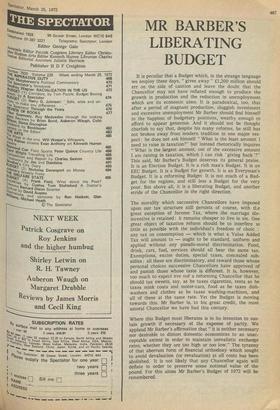MR BARBER'S LIBERATING BUDGET
It is peculiar that a Budget which, in the strange language we employ these days, "gives away" £1,200 million should err on the side of caution and leave the doubt that the Chancellor may not have refiated enough to produce the growth in production and the reduction in unemployment which are its economic aims. It is paradoxical, too, that after a period of stagnant production, sluggish investment and excessive unemployment Mr Barber should find himself in the happiest of budgetary positions, weathy enough •to afford to appear generous. And it should not be thought churlish to say that, despite his many reforms, he still has not broken away from modern tradition in one major respect: he does not ask himself "What is the least amount I need to raise in taxation?" but instead rhetorically inquires "What is the largest amount, out of the excessive amount I am raising in taxation, which I can risk 'giving back '?" This said, Mr Barber's Budget deserves its general praise. It is an Election Budget. It is a rich man's Budget. It is an EEC Budget. It is a Budget for growth. It is an Everyman's Budget. It is a reforming Budget It is not much of a Budget for the regions, and still less a Budget for the very poor. But above all, it is a liberating Budget, and another stride of the Chancellor in the right direction.
The morality which successive Chancellors have imposed upon our tax structure still persists of course, with the great exception of Income Tax, where the marriage disincentive is retained : it remains cheaper to live in sin. One great object of taxation reform should be to interfere is little as possible with the individual's freedom of choic : any tax on consumption — which is what a Value Added Tax will amount to — ought to be standard, uniform and applied without any pseudo-moral discrimination. Food, drink, cars, fuel, services should all bear the same tax. Exemptions, excise duties, special taxes, concealed subsidies: all these are discriminatory, and reward those whose personal choices successive Chancellors have approved of and punish those whose taste is different. It is, however, too much to expect eve nof a reforming Chancellor that he should tax sweets, say, as he taxes cigarettes, rents as he taxes mink coats and motor-cars, food as he taxes dishwashers and clothes as he taxes washing-machines, and all of these at the same rate. Yet the Budget is moving towards this. Mr Barber is, to his great credit, the most amoral Chancellor we have had this century.
Where this Budget most liberates is in its intention to sustain growth if necessary at the expense of parity. We applaud Mr Barber's affirmation that " it is neither necessary nor desirable to distort domestic economices to an unacceptable extent in order to maintain unrealistic exchange rates, whether they are too high or too low." The tyranny of that aberrant form of financial orthodoxy which sought to avoid devaluation (or revaluation) at all costs has been abolished. It is not likely that any Chancellor again will deflate in order to preserve some notional value of the pound. For this alone Mr Barber's Budget of 1972 will be remembered.










































 Previous page
Previous page